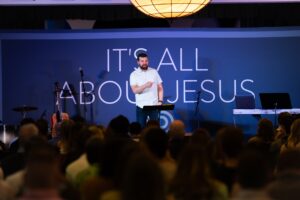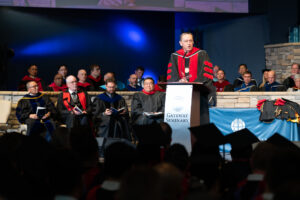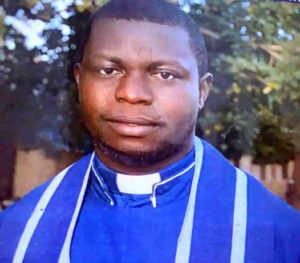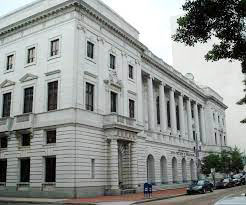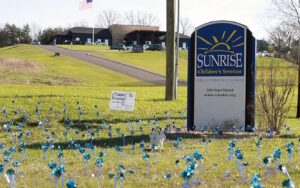
JACKSON, Tenn. (BP)–Southern Baptists’ future rests on redirecting resources from the Deep South, abandoning racism and remaining committed to biblical orthodoxy, expository preaching, the Lordship of Christ and sound doctrine, declared Daniel Akin, president of Southeastern Baptist Theological Seminary, during an Oct. 8 address at Union University in Jackson, Tenn.
Speaking during the school’s Oct. 6-9 conference on “Southern Baptists, Evangelicals and the Future of Denominationalism,” Akin told conferees that $12 billion was given through the denomination’s local churches in 2008 but “only 2.75 percent ever left the borders of the United States.”
Church planting in “unreached and unserved areas of our nation is little more than a trickle,” Akin said. “Why we plant more churches in Georgia, Alabama, South Carolina, North Carolina and Tennessee than we do in New York, Illinois, Michigan, Pennsylvania, Washington and California is absolutely incomprehensible to me.”
Every Southern Baptist congregation should be “a church-planting church and every church a Great Commission church,” Akin added. “This must be more than a slogan. It must be a reality.”
Akin called for a church planting strategy “that assaults the major population centers of North America.”
“This will inspire and energize a younger generation because of the excitement entailed in new works. For too long we have neglected the great urban centers such as New York, Washington D.C., Boston, Los Angeles, and Seattle, cities that are almost completely bereft of evangelical influence,” Akin said. “This cannot continue or we will face a future of irrelevance and insignificance.”
Noting the book “Simple Church,” written by Thom S. Rainer and Eric Geiger, Akin called for Southern Baptists to do “simple convention.”
“We must streamline our structure, clarify our identity and maximize our resources,” Akin said. “A younger generation wants a leaner, quicker and more missional convention that pursues the unreached and under-served in our nation and around the world.
“That is where they are going and our leadership at every level will either get on board or be left behind,” Akin added. “In other words, we will change the way we operate, whether we like it or not.”
Akin warned against nostalgia for the status quo of past decades, which could be an obstacle to revitalization.
“Many Southern Baptists are trapped in a time warp,” Akin stated. “They are aiming at a culture that went out of existence years ago. They use mid-20th century methods and pine for a nostalgic golden age. They are convinced if we would just go back to the way things were, we would experience a spiritual renaissance that would restore the good old days. … We are not going back. We will move forward into the future, whether we like it or not.”
Akin also said the name “Southern Baptist Convention” needs to be changed, because it isn’t “best for identifying who we are and want to be in the future.”
One key to a positive future for the SBC would be the abandonment of racism and an increasing diversity among the membership of local churches, Akin said.
“Southern Baptists were born, in part, out of a racist context and have a racist heritage,” Akin observed. “That will forever be to our shame. To deny or ignore this is foolish. Actually it is dishonest.”
Akin commended the 1995 annual meeting of the Southern Baptist Convention in Atlanta that adopted a “Resolution on Racial Reconciliation,” in which messengers repudiated slavery and apologized for racism.
“To my utter dismay, some still refuse to own up to our past transgression, perhaps because the seeds of this sin are still scattered across too much of our denomination, especially in the South where most of our people still live,” Akin said. “We must confront the sobering reality that the Southern Baptist Convention remains a mostly middle-class, mostly white network of mostly declining churches in the South.”
The proof of the SBC’s inadequate diversity can be observed by attending worship services or denominational meetings, Akin indicated.
“If you doubt what I am saying look around today, visit most state conventions, attend an annual Southern Baptist Convention meeting or drop in on 99 percent of our churches on any given Sunday,” Akin said. “We can integrate the military, athletics and the workplace, but we can’t integrate the body of Christ. The lack of urgency and concern in this area is mind-boggling. It is spiritually inexcusable.”
Continued racial sin will thwart the yearning of some Southern Baptists for revival or for a Great Commission Resurgence, Akin cautioned.
“Until we get right about race, I am convinced God will not visit us with revival,” Akin said. “The plea for a Great Commission resurgence will not move heaven, and it will be scoffed at by the world as a sham. Starting at home, we must pursue a vision for our churches that looks like heaven.”
Akin told conferees that his remarks at Union represented the fourth time in five years he had “addressed some aspect of the future of the Southern Baptist Convention.”
He expressed dismay that more attention had not been paid to the first axiom of a chapel message delivered in April at Southeastern Seminary in which Akin had called for churches to “be committed to the lordship of Jesus Christ in every area.”
The axiom, Akin said, “has been passed over and quickly dismissed with the wave of a hand and words like, ‘We all believe that.'”
But, Akin countered, “I fear we do not and as a result we too often devolve into petty quarrels, territorialism, turfism, defensiveness and personal agendas that find the Savior nowhere in sight.”
Southern Baptists must continue to make clear their commitment to the Bible as inerrant, infallible and sufficient in all matters, Akin added.
Preaching must be “Word-based, … theological in content and on fire in delivery,” he said. “Nothing is more exciting than theology. Nothing is more relevant than doctrine. No one is more beautiful than Christ. To proclaim these glorious truths in a dispassionate or boring manner is inexcusable. It is, I believe, sinful.”
Akin also affirmed the Baptist Faith and Message 2000 “as a healthy and sufficient guide for building theological consensus.”
He noted several points of doctrine and theology on which Southern Baptists agree, such as the triune God, rejection of evolution, the full deity and perfect humanity of Jesus, penal substitutionary atonement, the need for regenerate church membership, salvation by grace alone through faith alone in Christ alone, the reality of an eternal heaven and an eternal hell and the sanctity of life from conception to natural death.
Southern Baptists also agree on the “sanctity of heterosexual marriage, the goodness of sex in marriage and the gift of children, lots of them,” Akin added.
Akin also emphasized that some doctrines are not “first-order doctrines … basic and essential to the Christian faith.” Southern Baptists, he said, may not necessarily agree with each other on such matters as Calvinism, elders, whether certain spiritual gifts are still active, the time of the rapture and the nature of the millennium.
–30–
Keith Hinson is an associate in communications services for the Alabama Baptist State Board of Missions.





